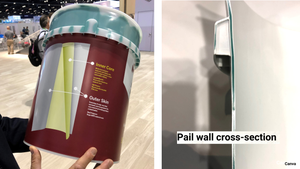DCHP-free peroxide formulation for composite applications introduced
Timely release as the European Union recently reclassified DCHP as a category 1B reproductive toxin.
October 19, 2018

Nouryon (formerly AkzoNobel Specialty Chemicals) has introduced a new dibenzoyl peroxide (BPO) formulation, Perkadox GB-50, to processors in the composites market. GB-50 will replace Perkadox CH-50, a peroxide that is desensitized (or “phlegmatized”) with dicyclohexyl phthalate (DCHP), which the European Union recently reclassified as a category 1B Reproductive Toxin.
|
“With Perkadox GB-50, we have created a DCHP-free alternative. Following testing in our RD&I labs and by select customers around the world, we have determined that it maintains the same performance level as its CH-50 predecessor,” says Ross Opsahl, Polymer Chemistry Business Development Manager. The new product is phlegmatized with ethylene glycol dibenzoate (EGDB).
“Perkadox GB-50 will be the only DCHP-free form of dry BPO available and will replace Perkadox CH-50 as the go-to curing agent for the markets it serves,” Opsahi says. Those include use as a curing agent for road markings, flooring, elastomeric roof coatings, adhesives, chemical anchors and other composites. It will be available in the first half of 2019.
“Perkadox CH-50 can still be used globally, but customers who work with it may face more stringent risk management measures,” explained Glen Rosini, Product Safety and Regulatory Affairs Manager, Polymer Chemistry.
Nouryon is currently expanding capacity at its site in Los Reyes, Mexico to produce GB-50 and will be able to ship the product all over the world. The expansion is expected to be completed in May 2019.
“Nouryon is committed to ensuring the safety and sustainability of our products,” says Johan Landfors, Managing Director Polymer Chemistry. “With GB-50, we worked proactively to develop a solution to meet our customers’ needs and to address the concerns associated with DCHP.”
About the Author(s)
You May Also Like





